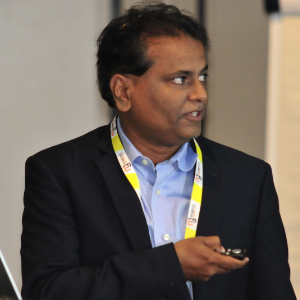Title : Perturbed stress granule dynamics in RNA-mediated neurodegenerative diseases
Abstract:
Amyotrophic lateral Sclerosis (ALS) is a debilitating disease involving the progressive loss of motor functions resulting in neuronal death. Recently, several genes have found the mutated in ALS and majority of these ALS-causative gene are involved in regulating RNA metabolism. FUS and TDP-43, DNA/RNA binding proteins with similar functions, are found to be mutated in both sporadic and familial forms of ALS. Using a Drosophila model for FUS-associated ALS that was developed by our laboratory, we performed an unbiased genetic screen to identify modifiers of FUS toxicity. We discovered muscleblind (mbl), the Drosophila homolog of human muscleblind-like (MBNL), as a strong modifier of neurodegeneration. MBNL1 colocalizes in cytoplasmic stress granules in ALS patient cells carrying pathogenic mutations in FUS. Muscleblind-like proteins have been linked to several neurodegenerative diseases, and understanding how MBNL can modulate FUS toxicity in ALS will help to elucidate its role in other diseases, including myotonic dystrophy, Huntington’s disease and spinocerebellar ataxia. We found that RNAi-mediated knockdown of Drosophila mbl rescues neurodegenerative phenotypes caused by ALS-associated mutant FUS in our model. Interestingly, overexpression of muscleblind strongly enhanced the FUS toxicity in vivo. We performed RNA sequencing using Drosophila brains expressing WT or mutant FUS with or without mbl to understand molecular mechanisms of mbl mediated suppression. Our RNA sequencing approach identified several genes whose expression is altered when FUS is overexpressed, and subsequently returned to almost normal following knockdown of endogenous mbl. Quantitative, reverse transcription, polymerase chain reaction (qPCR) confirmed expression changes of identified genes. Taken together, the results of these experiments not only provide new insights into the mechanisms by which mutant FUS is toxic in patients with ALS, but they will also have broader implications for other related neurodegenerative diseases.
Audience take away:
• The audience will learn about the molecular mechanisms of human motor neuron diseases such as ALS for which currently no cure available. Our currently work demonstrates the role of cytoplasmic stress granules in RNAmediated neurodegeneration using mammalian neuronal and animal model systems.
• This presentation will help the audience in learning how to model human motor neuron diseases in different model systems, perform unbiased genetic screen and identify molecular pathways that regulate pathological symptoms associated with neurodegenerative diseases. These findings would enhance research, teaching and training skills of the audience.




